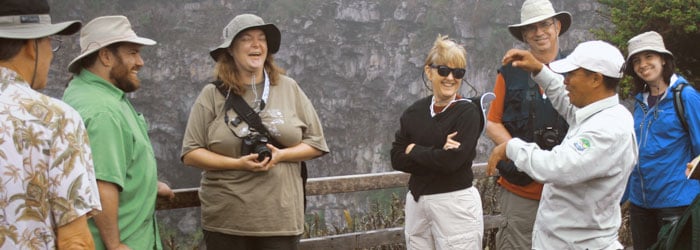Trip Leader Success: How to Work with Your In-Country Guide
Foreign travel brings unforgettable and often surprising experiences. While the unexpected is part of what makes each trip exciting and memorable, planning for unforeseen situations can help ensure your journey goes smoothly.
The In-Country Guide is perhaps the most important ingredient in a successful trip. Aside from their skills and knowledge, the working relationship between you as a Trip Leader and the In-Country Guide is critical. As a Trip Leader, your ability to communicate together and know your roles is essential.
Together, the Trip Leader and In-Country Guide form the leadership team. Each has an equal amount of responsibility, but in different areas.
1. Know each other’s roles
The Trip Leader typically represents an organization or U.S. institution, imparts specialty knowledge, and may provide lectures and facilitate informal discussions. The In-Country Guide is the local expert and takes care of logistical issues. They are trained in first aid and CPR, understand emergency procedures, and fill out any incident reports. The Trip Leader is extra aware of group mentality in order to ensure satisfaction among participants and takes an authoritative role with maintaining proper foreign etiquette. Make sure your In-Country Guide knows that you are working together as partners, rather than in the roles of you as supervisor and he or she as subordinate.
2. Meet with your In-Country Guide early on to review trip details
It’s best to hold this meeting before your arrive to ensure you are on the same page with planned activities. This is valuable as it gives you an opportunity to have important questions answered to prevent problems from occurring. Suggested topics to discuss include any equipment or clothing necessary for activities, in-country transportation, and any anticipated hazards.
3. Communicate frequently during the trip
Confer with your In-Country Guide(s) frequently to make sure that things are going smoothly and to convey any requests from the group. Confirm morning departure times, meal times, picnic lunches, scheduled activities, and optional activities.
4. Respect cultural differences
When working with people from a different culture, remember that the way they interact and even their basic approach to life may be different from yours. Americans are accustomed to a direct, taking-care-of-business approach, which may be offensive elsewhere. Many cultures have a prescribed ritual of greetings and pleasantries that must be gone through at each meeting. Keep this in mind and begin with some general pleasantries (nothing too personal, as that can be offensive too).
5. Verify you understand each other
English may be a second language for your In-Country Guide. Don’t assume you’ll be completely understood the first time you say something, even if he or she smiles and nods and says, “Yes, I understand.” Verify that they have understood. Similarly, be sure that you understand what your In-Country Guide means, not just what he or she says. It is customary in many parts of the world to never say no to anyone. If the issue is important, discreetly discern whether yes is a guarantee, a possibility, or simply a polite response.
6. Be respectful of your In-Country Guide’s authority and capability.
If you’re working with a crew of driver-guides in East Africa, one of them will be the head driver-guide, to whom you should address any problems or questions. In facing a frustrating situation, an angry reaction is likely to be ineffective, or even counterproductive in other cultures. You’ll lose face and may severely embarrass the other person. Smile and appeal to his or her sympathy, reason, or amazing ability to accomplish the impossible.
7. Don’t change the itinerary unless it’s absolutely necessary
In-Country Guides know their country and the trip itinerary. They know which activities can and can’t be changed or added, and the degree of difficulty of a given excursion. Adhere to the planned itinerary as much as possible. Even a minor change may throw off the rest of the day.
8. Share strategies for needy participants
If someone in your group is behaving difficult or has special needs, work with your In-Country Guide to accommodate this without unduly limiting the rest of the group. On occasion it may be necessary to gently discourage someone from participating if you feel they might endanger themselves or disrupt the group. Use your best judgment.



